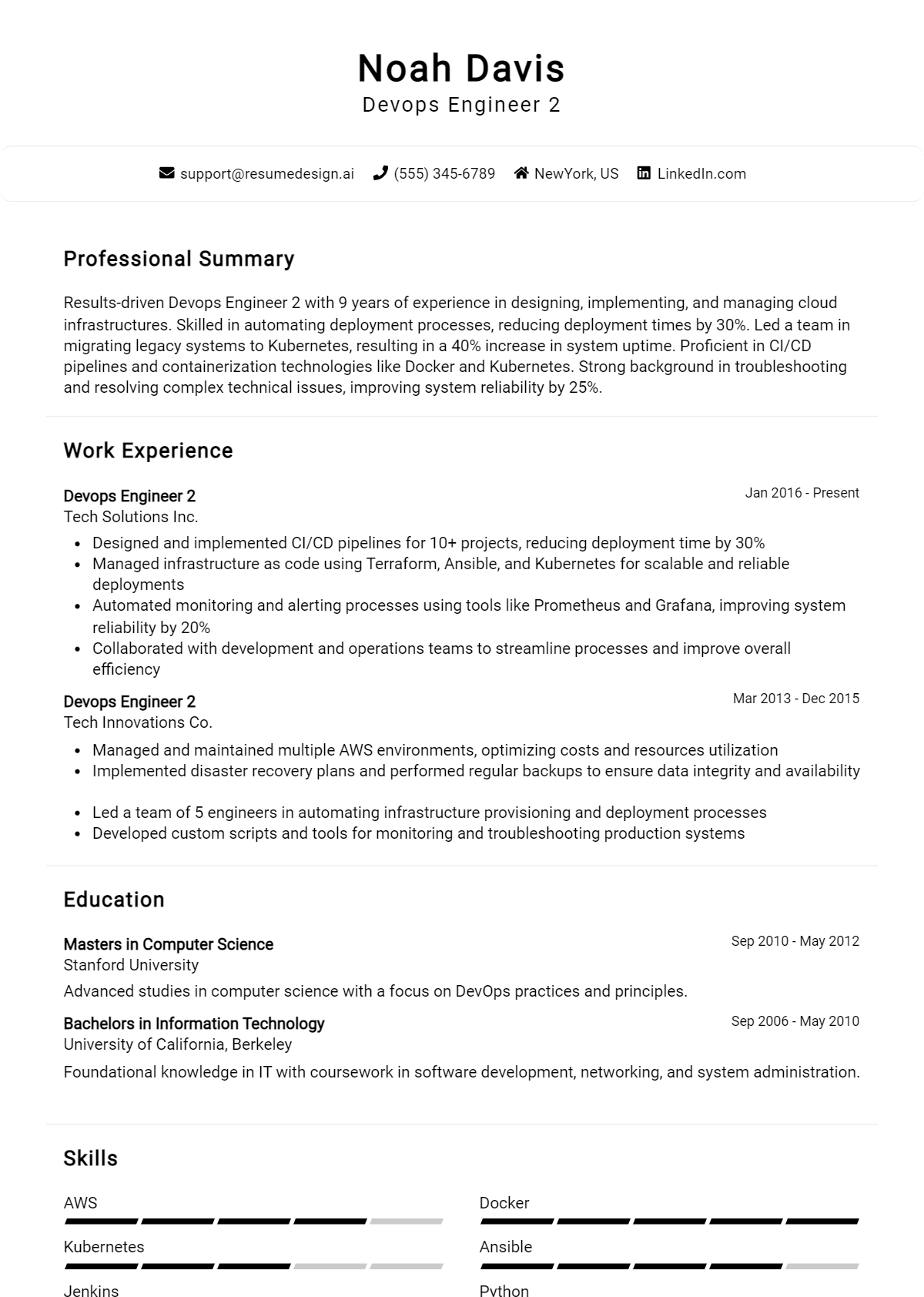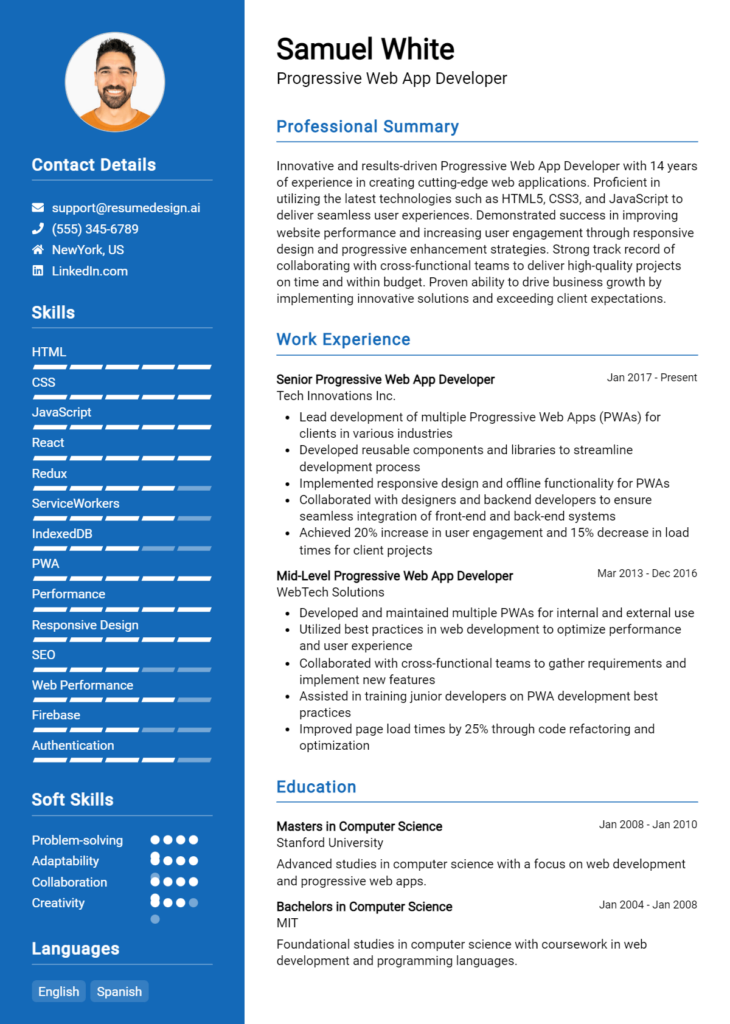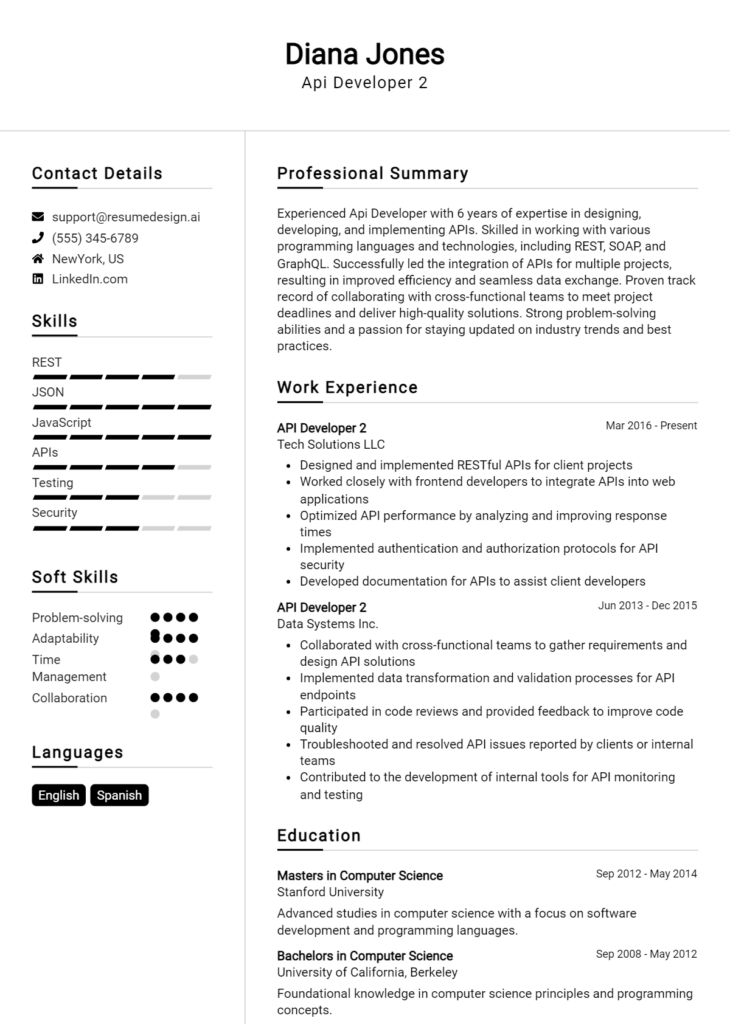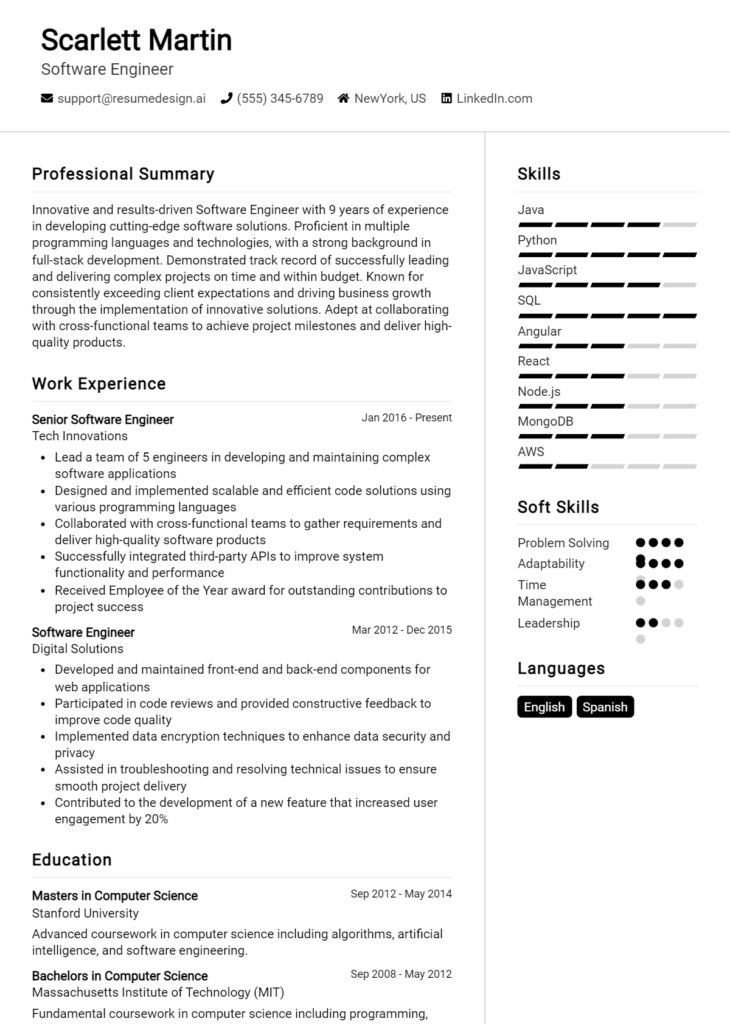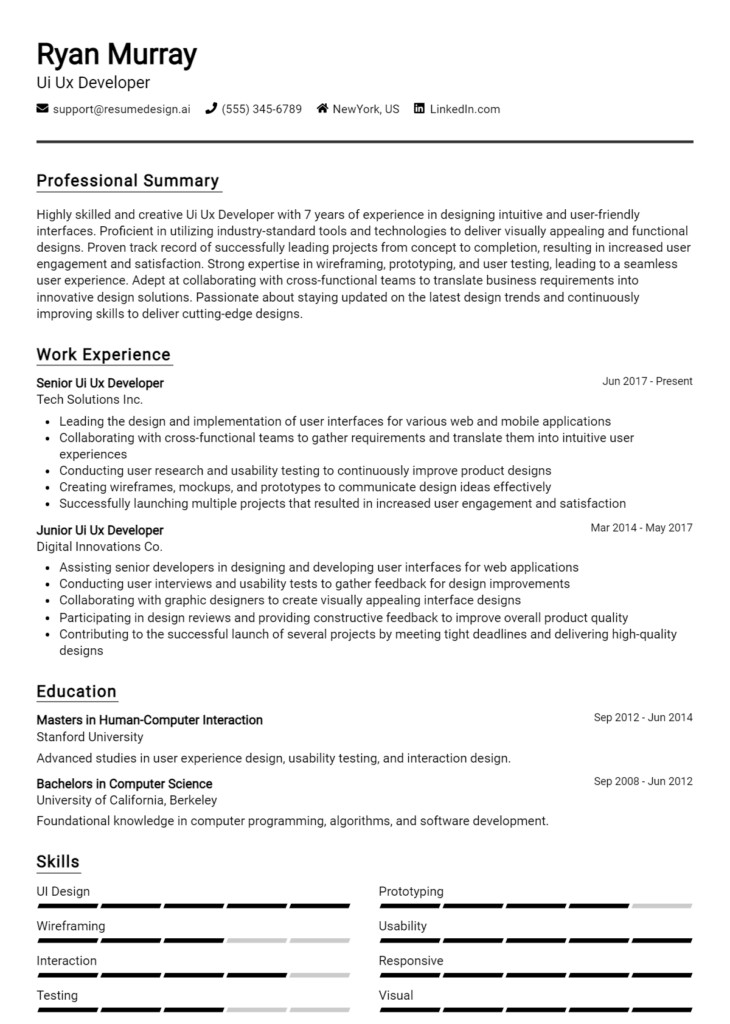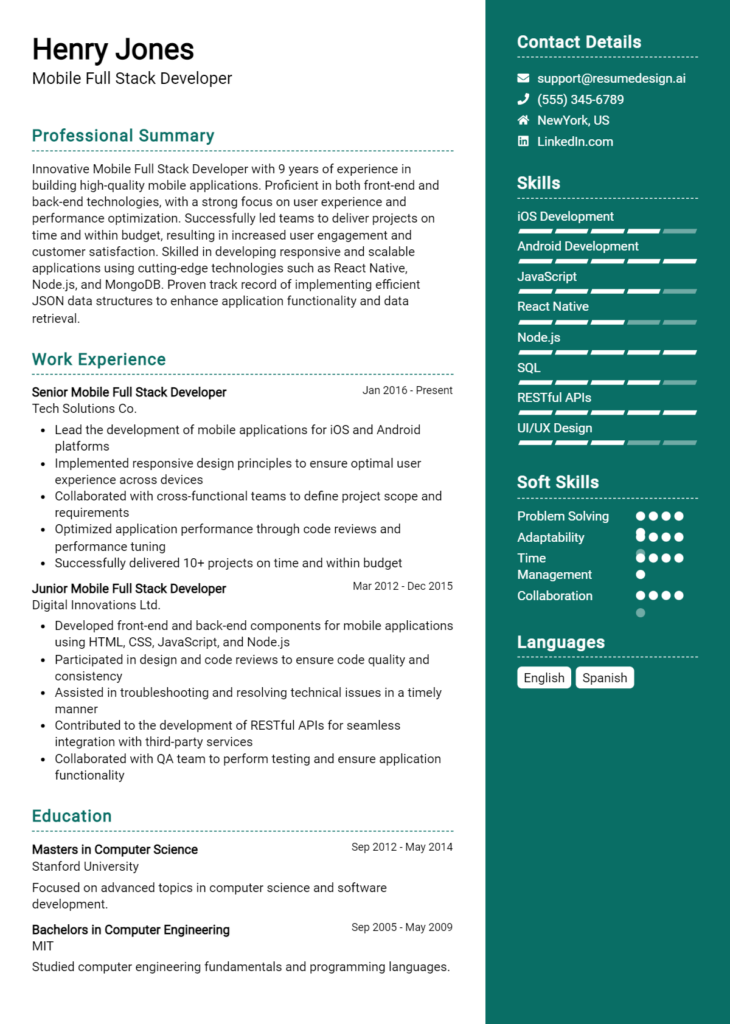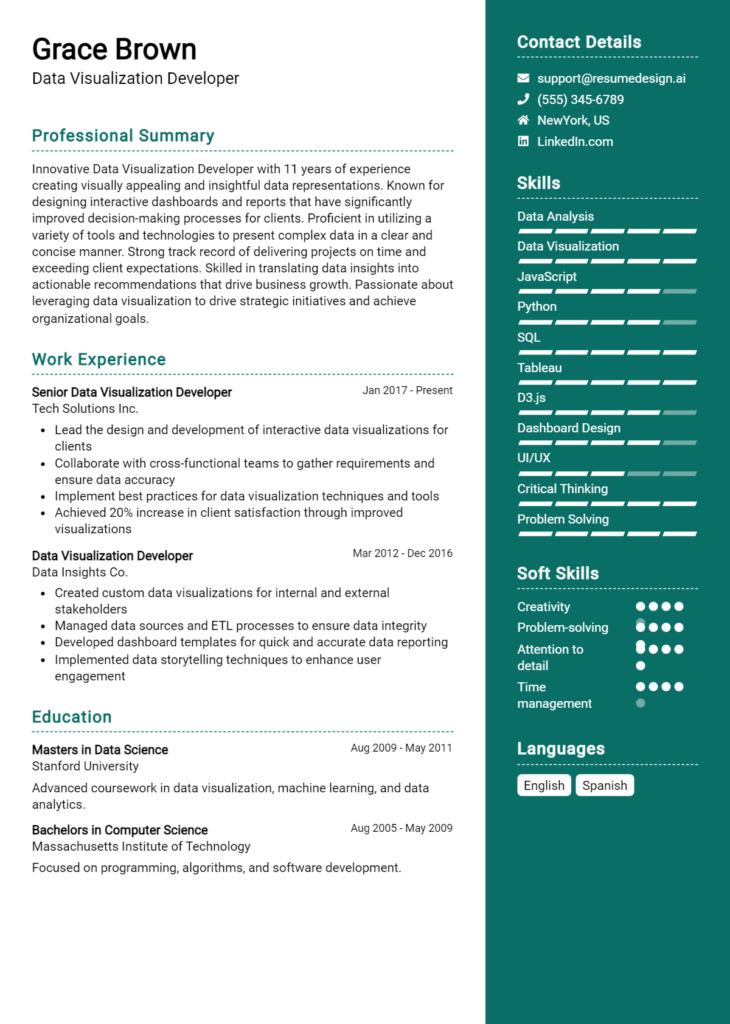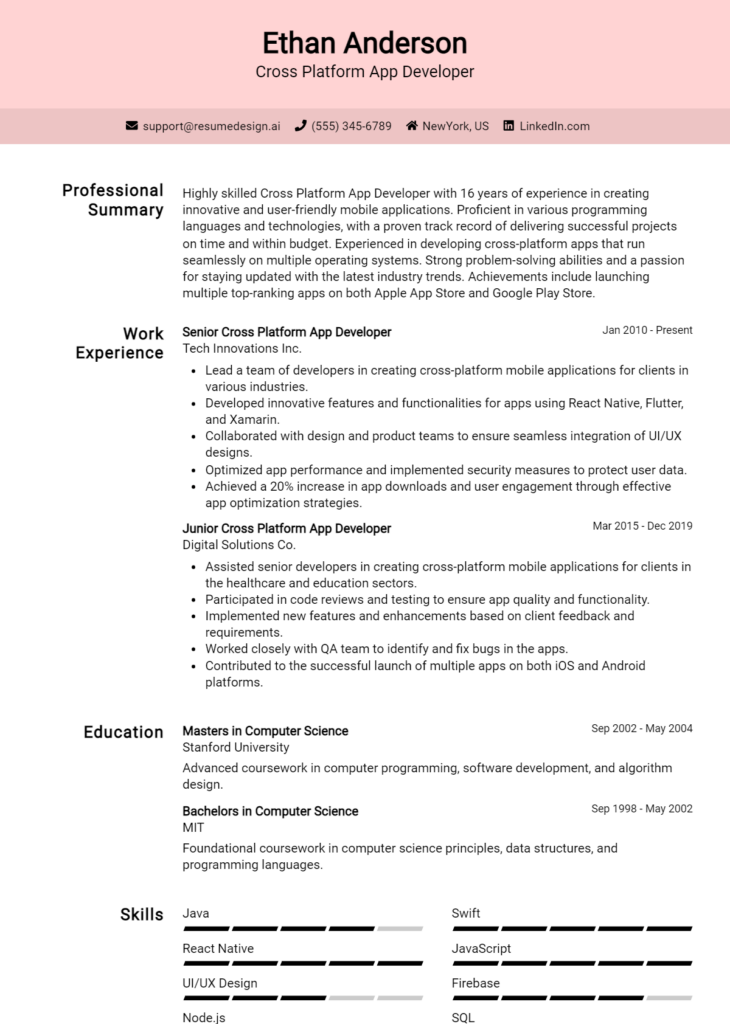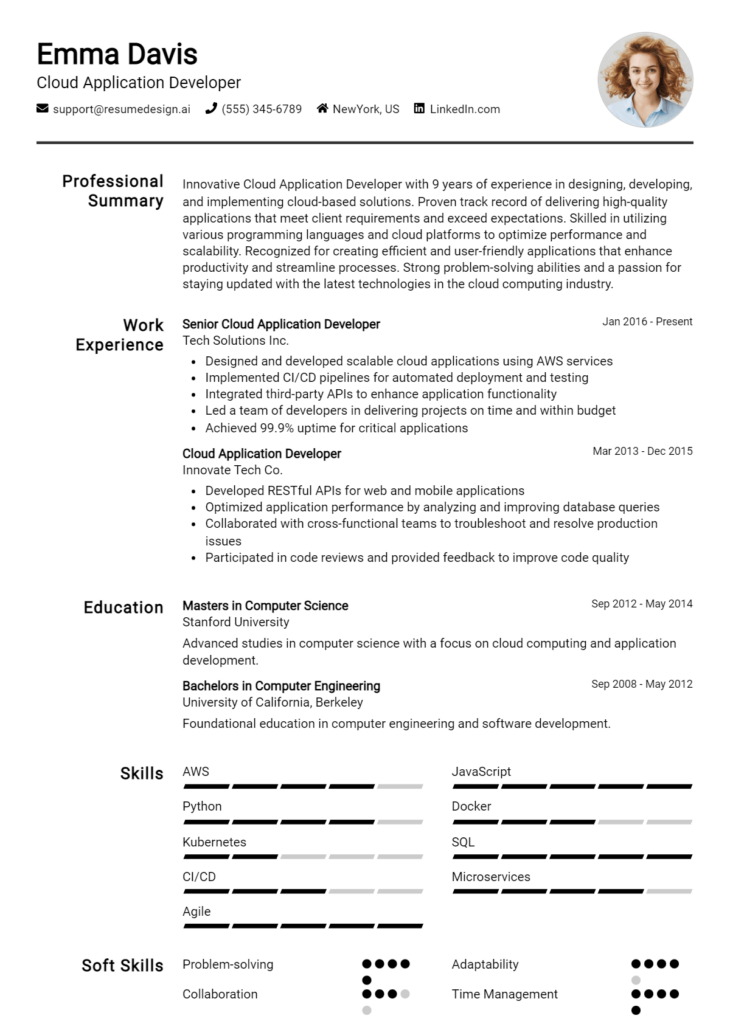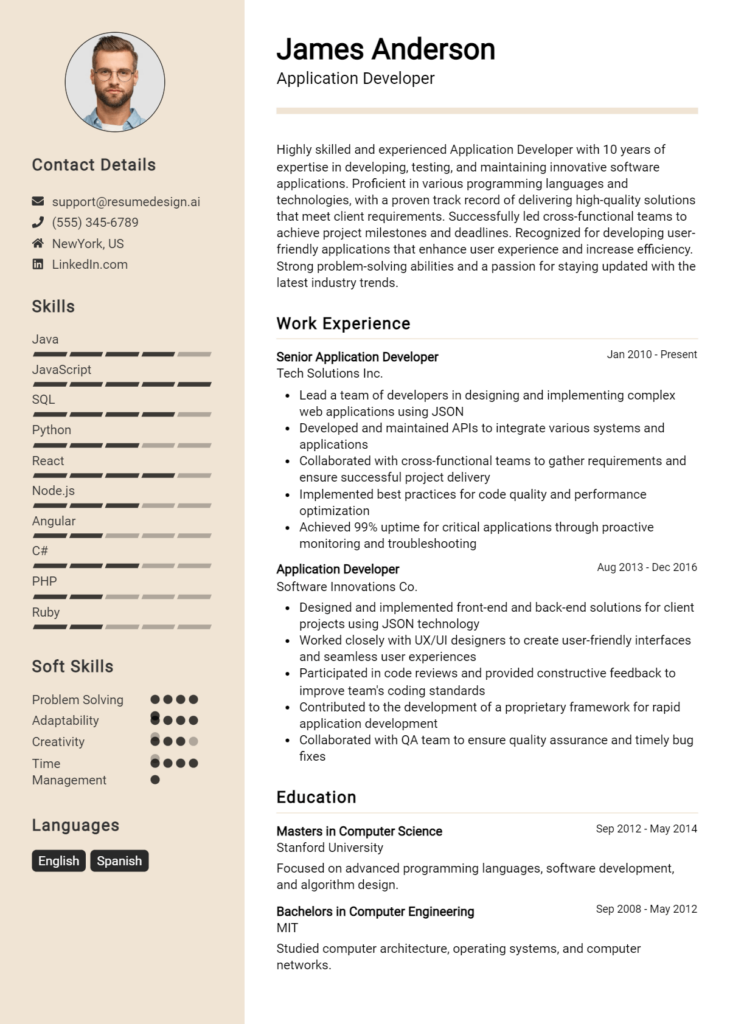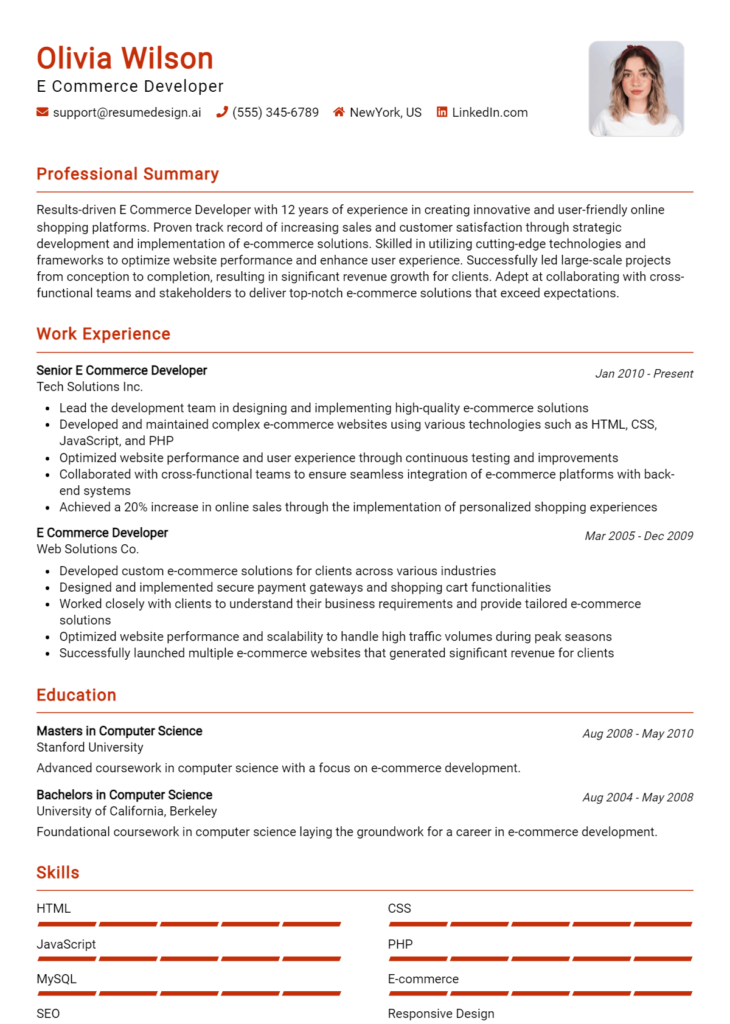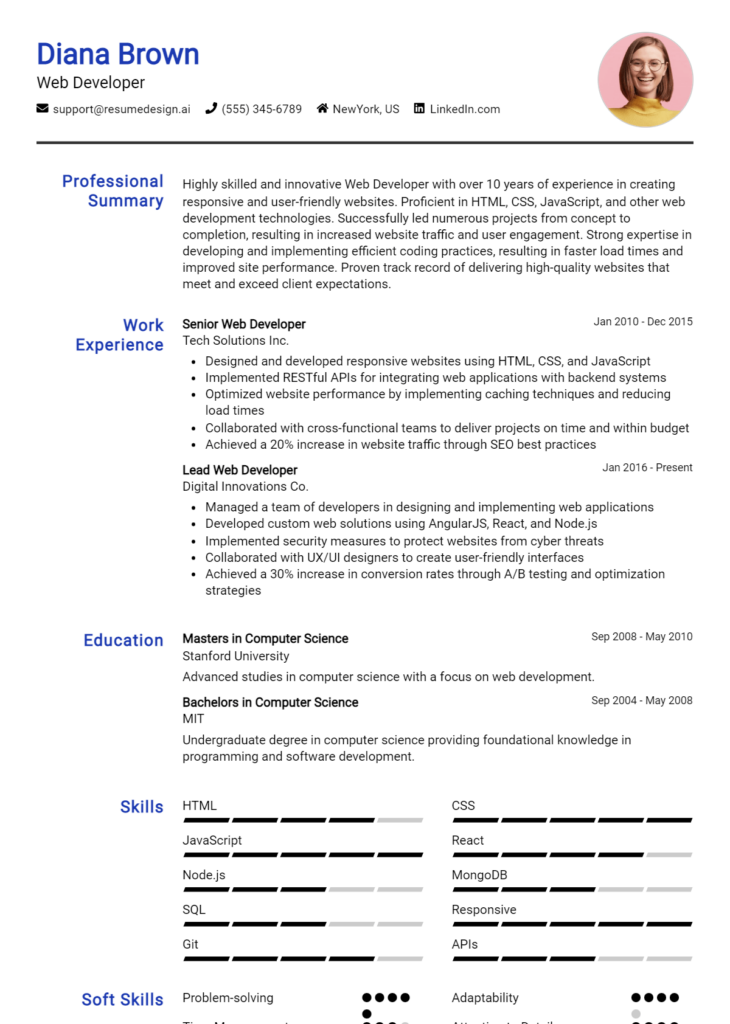DevOps Engineer Core Responsibilities
A DevOps Engineer plays a crucial role in bridging the gap between development and operations, ensuring seamless collaboration across departments. Key responsibilities include automating processes, managing CI/CD pipelines, and monitoring system performance. Essential skills encompass technical proficiency in cloud services, scripting, and configuration management, alongside strong problem-solving abilities. These competencies drive efficiency, reduce deployment times, and enhance system reliability, ultimately aligning with the organization's overall objectives. A well-crafted resume should highlight these qualifications to attract potential employers effectively.
Common Responsibilities Listed on DevOps Engineer Resume
- Implementing and managing CI/CD pipelines for automated code deployment.
- Monitoring system performance and troubleshooting issues promptly.
- Collaborating with development and operations teams to streamline workflows.
- Automating infrastructure provisioning using tools like Terraform or Ansible.
- Ensuring security best practices are integrated throughout the development lifecycle.
- Managing cloud infrastructure and services (e.g., AWS, Azure, Google Cloud).
- Conducting system performance tuning and optimization.
- Developing and maintaining configuration management systems.
- Creating and managing containerized applications using Docker or Kubernetes.
- Implementing monitoring and logging solutions for system visibility.
- Facilitating incident response and post-mortem analysis.
- Training team members on DevOps practices and tools.
High-Level Resume Tips for DevOps Engineer Professionals
In today's competitive job market, a well-crafted resume is essential for DevOps Engineer professionals looking to make a strong first impression on potential employers. Your resume serves as a critical introduction, showcasing not only your technical skills but also your accomplishments and experience in the field. Given the unique blend of software development and IT operations that defines DevOps, it's imperative that your resume reflects both your technical expertise and your ability to drive efficiency and collaboration. This guide will provide practical and actionable resume tips specifically tailored for DevOps Engineer professionals, ensuring your application stands out in a crowded field.
Top Resume Tips for DevOps Engineer Professionals
- Tailor your resume to the job description by incorporating relevant keywords and phrases that match the specific requirements of the position.
- Highlight your technical skills prominently, including tools and technologies such as Docker, Kubernetes, Jenkins, Terraform, and cloud services like AWS or Azure.
- Showcase relevant experience by detailing your roles in previous projects, focusing on your contributions to the DevOps process and any specific methodologies employed.
- Quantify your achievements with metrics; for example, mention how you reduced deployment time by a certain percentage or improved system reliability.
- Include certifications relevant to DevOps, such as AWS Certified DevOps Engineer, Docker Certified Associate, or Certified Kubernetes Administrator, to validate your expertise.
- Emphasize your collaboration and communication skills, as DevOps heavily relies on teamwork and cross-department cooperation.
- Utilize action verbs to describe your responsibilities and achievements, making your contributions more dynamic and impactful.
- Keep the format clean and professional, ensuring your resume is easy to read and navigate, with consistent font choices and bullet points.
- Consider including a summary or objective statement at the top of your resume that outlines your career goals and key qualifications in the DevOps space.
By implementing these tips, you can significantly increase your chances of landing a job in the DevOps Engineer field. A well-structured resume that effectively highlights your skills, experiences, and achievements will not only capture the attention of recruiters but also demonstrate your readiness to contribute in a fast-paced DevOps environment.
Why Resume Headlines & Titles are Important for DevOps Engineer
In the competitive field of DevOps engineering, a well-crafted resume headline or title serves as a crucial first impression for hiring managers. It encapsulates a candidate's key qualifications and expertise in a concise and impactful manner, allowing them to stand out among numerous applicants. A strong headline can quickly grab attention, providing a snapshot of the candidate’s experience, skills, and suitability for the role. Thus, it is essential that the headline is not only relevant to the job being applied for but also succinct enough to leave a lasting impression.
Best Practices for Crafting Resume Headlines for DevOps Engineer
- Make it concise: Aim for a headline that is clear and to the point, ideally within 10-15 words.
- Be role-specific: Tailor the headline to directly reflect the DevOps position you are applying for.
- Highlight key skills: Incorporate relevant technical skills or certifications that are pertinent to DevOps.
- Showcase experience: Mention years of experience or specific achievements that demonstrate your capability.
- Use impactful language: Choose dynamic and powerful words that convey confidence and expertise.
- Avoid jargon: Ensure the language is understandable and relatable to a wide range of hiring managers.
- Keep it professional: Maintain a formal tone that reflects your professionalism and seriousness about the job.
- Update regularly: Revise your headline for each application to match the specific job requirements.
Example Resume Headlines for DevOps Engineer
Strong Resume Headlines
Certified DevOps Engineer with 5+ Years in Cloud Infrastructure Management
Results-Driven DevOps Specialist Focused on Continuous Integration and Deployment
Experienced DevOps Engineer: Expert in Docker, Kubernetes, and AWS Solutions
Weak Resume Headlines
DevOps Engineer Seeking Opportunities
IT Professional with Various Skills
The strong headlines listed above are effective because they provide specific information about the candidate’s qualifications, making it easy for hiring managers to quickly gauge their suitability for the role. They highlight relevant experience, certifications, and technical skills that directly align with the needs of a DevOps position. In contrast, the weak headlines fail to impress as they are vague and lack detail, offering no insight into the candidate's unique strengths or relevance to the job. This lack of specificity can leave hiring managers unimpressed and leads to a missed opportunity for the applicant.
Writing an Exceptional DevOps Engineer Resume Summary
A resume summary is a crucial component for a DevOps Engineer, as it serves as a powerful introduction that can make or break the first impression on hiring managers. A well-crafted summary encapsulates key skills, relevant experience, and notable accomplishments in a manner that resonates with the job description. By quickly conveying the candidate's value, a strong summary helps to capture the attention of recruiters and sets the tone for the rest of the resume. It should be concise, impactful, and tailored to the specific position being applied for, ensuring that it aligns with the needs of the organization.
Best Practices for Writing a DevOps Engineer Resume Summary
- Quantify achievements: Use numbers and metrics to showcase your impact and success in previous roles.
- Focus on relevant skills: Highlight technical skills and tools that are pertinent to the DevOps role you are seeking.
- Tailor the summary: Customize your summary for each job application by aligning it with the job description and requirements.
- Be concise: Aim for 2-4 sentences that clearly articulate your strengths without unnecessary details.
- Showcase certifications: Mention any relevant certifications that add credibility and demonstrate expertise in the field.
- Highlight teamwork and collaboration: Emphasize your ability to work effectively within cross-functional teams, as collaboration is key in DevOps.
- Use action verbs: Start sentences with strong action verbs to convey your contributions dynamically and engagingly.
- Reflect your career goals: Incorporate your professional aspirations to indicate your commitment to growth in the field.
Example DevOps Engineer Resume Summaries
Strong Resume Summaries
Results-driven DevOps Engineer with over 5 years of experience in automating deployment pipelines and improving system reliability. Increased deployment frequency by 30% and reduced incident response time by 40% through effective monitoring and alerting systems.
Detail-oriented DevOps specialist skilled in AWS and Kubernetes, with a proven track record of reducing infrastructure costs by 25% while enhancing system performance. Successfully led a team to implement CI/CD processes that improved code delivery speed by 50%.
Enthusiastic DevOps Engineer with expertise in Docker and Jenkins, committed to optimizing workflows and enhancing collaboration. Spearheaded a project that achieved a 15% reduction in server downtime through proactive maintenance and automation strategies.
Weak Resume Summaries
DevOps Engineer with a few years of experience looking for a challenging role in a reputable company.
Experienced in various technologies and tools. I want to contribute to a team and help with projects.
The examples of strong resume summaries are effective because they provide specific details about accomplishments, quantifiable results, and relevant skills that demonstrate a strong fit for the role. In contrast, the weak summaries are vague and fail to convey any significant achievements or skills, making them less impactful and memorable to hiring managers.
Work Experience Section for DevOps Engineer Resume
The work experience section of a DevOps Engineer resume holds significant importance as it serves as a platform for candidates to demonstrate their technical skills, leadership capabilities, and commitment to delivering high-quality products. This section not only outlines past job roles but also highlights the candidate's ability to manage teams and streamline processes in a fast-paced environment. To stand out, it is crucial to quantify achievements and align experiences with industry standards, showcasing how one's contributions have positively impacted previous employers.
Best Practices for DevOps Engineer Work Experience
- Highlight specific technical skills relevant to DevOps, such as cloud platforms, CI/CD tools, and scripting languages.
- Quantify achievements with metrics, such as reduced deployment times or increased system reliability.
- Demonstrate leadership by describing experiences managing teams or projects.
- Include collaboration examples, showcasing work with cross-functional teams.
- Use action verbs to start bullet points, which creates a dynamic and engaging narrative.
- Tailor the work experience to align with the job description, emphasizing relevant projects and responsibilities.
- Showcase continuous learning and adaptation to new tools and technologies in the DevOps space.
- Maintain clarity and conciseness to ensure easy readability for hiring managers.
Example Work Experiences for DevOps Engineer
Strong Experiences
- Led a team to implement a CI/CD pipeline that reduced deployment time by 40%, resulting in a 30% increase in development team productivity.
- Successfully migrated on-premises applications to AWS, improving system uptime to 99.9% and reducing operational costs by 25%.
- Collaborated with cross-functional teams to automate testing processes, decreasing bug rates by 50% and enhancing product quality.
- Designed and implemented infrastructure as code using Terraform, which enabled rapid scaling and reduced provisioning time by 60%.
Weak Experiences
- Worked on a project involving cloud technologies.
- Helped the team with deployments and made some improvements.
- Participated in meetings that discussed DevOps practices.
- Assisted in managing servers and networks.
The examples provided illustrate the difference between strong and weak experiences in a DevOps Engineer resume. Strong experiences are characterized by specific, quantifiable outcomes that demonstrate the candidate's technical expertise, leadership, and collaboration with teams. In contrast, weak experiences lack detail and do not convey a meaningful contribution or impact, making them less compelling to potential employers. By emphasizing relevant achievements and responsibilities, candidates can present themselves as valuable assets in the DevOps field.
Education and Certifications Section for DevOps Engineer Resume
The education and certifications section of a DevOps Engineer resume is crucial in establishing a candidate's foundation of knowledge and skills relevant to the role. It showcases the candidate's academic background, including degrees and specialized coursework, which demonstrates their understanding of the principles underlying software development and IT operations. Moreover, industry-relevant certifications and evidence of continuous learning highlight the candidate's commitment to staying up-to-date with the latest tools, technologies, and best practices in the rapidly evolving DevOps landscape. By providing this information, candidates can significantly enhance their credibility and alignment with job requirements, making a strong case for their potential contributions to prospective employers.
Best Practices for DevOps Engineer Education and Certifications
- Include relevant degrees in Computer Science, Information Technology, or related fields.
- List industry-recognized certifications such as AWS Certified DevOps Engineer, Docker Certified Associate, or Certified Kubernetes Administrator.
- Highlight specific coursework related to DevOps practices, cloud computing, automation, and system administration.
- Emphasize any specialized training in tools and technologies commonly used in DevOps, such as Jenkins, Terraform, and Ansible.
- Keep the section concise but informative, focusing on the most relevant qualifications.
- Update regularly to reflect new certifications or educational achievements.
- Consider adding any relevant online courses or bootcamps that enhance your skill set.
- Make sure to include the dates of completion for certifications to indicate currency.
Example Education and Certifications for DevOps Engineer
Strong Examples
- Bachelor of Science in Computer Science, University of Technology, 2020
- AWS Certified DevOps Engineer – Professional, 2023
- Docker Certified Associate, 2022
- Coursework: Continuous Integration and Continuous Deployment, Agile Methodologies, Cloud Infrastructure Management
Weak Examples
- Associate's Degree in Fine Arts, 2015
- MCSE: Server Infrastructure - certification expired 2020
- Basic HTML/CSS Online Course, 2018
- Certification in Windows 98, 1999
The examples listed as strong are considered relevant as they directly pertain to the skills and knowledge necessary for a DevOps Engineer role, showcasing both educational background and current industry certifications. In contrast, the weak examples highlight irrelevant degrees, outdated certifications, and courses that do not align with the technical demands of a DevOps position, which could undermine the candidate's qualifications in the eyes of potential employers.
Top Skills & Keywords for DevOps Engineer Resume
In the ever-evolving landscape of technology, a DevOps Engineer plays a crucial role in bridging the gap between development and operations, ensuring seamless collaboration and efficiency. Crafting a compelling resume is essential for showcasing your expertise, and highlighting the right skills is key to standing out in a competitive job market. Employers look for a blend of both hard and soft skills that demonstrate not only technical proficiency but also the ability to collaborate, communicate, and adapt in fast-paced environments. By emphasizing your relevant skills in your resume, you can effectively convey your value as a DevOps Engineer and increase your chances of landing the desired position.
Top Hard & Soft Skills for DevOps Engineer
Soft Skills
- Effective Communication
- Team Collaboration
- Problem-Solving
- Adaptability
- Critical Thinking
- Time Management
- Conflict Resolution
- Leadership
- Creativity
- Attention to Detail
- Empathy
- Analytical Thinking
- Continuous Learning
- Customer Focus
- Mentoring Skills
Hard Skills
- Continuous Integration/Continuous Deployment (CI/CD)
- Cloud Computing (AWS, Azure, Google Cloud)
- Containerization (Docker, Kubernetes)
- Infrastructure as Code (IaC) (Terraform, Ansible)
- Scripting Languages (Python, Bash, Ruby)
- Monitoring and Logging Tools (Prometheus, ELK Stack)
- Version Control Systems (Git, SVN)
- Operating Systems (Linux, Windows)
- Networking Fundamentals
- Database Management (SQL, NoSQL)
- Agile Methodologies
- Configuration Management
- Security Best Practices
- Automation Tools (Jenkins, GitLab CI)
- Performance Tuning
- Load Balancing Techniques
- Backup and Recovery Solutions
For a comprehensive view of your qualifications, don't forget to detail your relevant work experience in your resume, showcasing how these skills have been applied effectively in previous roles.
Stand Out with a Winning DevOps Engineer Cover Letter
Dear [Hiring Manager's Name],
I am writing to express my interest in the DevOps Engineer position at [Company Name] as advertised on [Where You Found the Job Posting]. With a solid background in software development and operations, coupled with my passion for automation and continuous integration, I am excited about the opportunity to contribute to your team. My experience in implementing CI/CD pipelines, managing cloud infrastructure, and utilizing configuration management tools has equipped me with the skills necessary to excel in this role.
In my previous position at [Previous Company Name], I successfully led the migration of our applications to a cloud-based environment, which resulted in a 30% reduction in downtime and improved system performance. I am proficient in tools such as Docker, Kubernetes, and Jenkins, and I have a deep understanding of scripting languages like Python and Bash that allow me to streamline processes and automate repetitive tasks. My collaborative approach to working with cross-functional teams has fostered an environment of continuous improvement and innovation.
I am particularly drawn to [Company Name] because of your commitment to leveraging cutting-edge technologies and fostering a culture of collaboration. I am excited about the prospect of working in an environment that values innovation and encourages team members to challenge the status quo. I am confident that my technical expertise, combined with my proactive problem-solving skills, make me a valuable asset to your team.
Thank you for considering my application. I look forward to the opportunity to discuss how my background, skills, and enthusiasms align with the goals of [Company Name]. I am eager to bring my experience in DevOps practices to your organization and help drive efficiency and effectiveness in your development and operations processes.
Sincerely,
[Your Name]
[Your LinkedIn Profile]
[Your Contact Information]
Common Mistakes to Avoid in a DevOps Engineer Resume
When crafting a resume for a DevOps Engineer position, it's crucial to present your skills and experience effectively. However, many candidates make common mistakes that can hinder their chances of landing an interview. Avoiding these pitfalls can help you create a compelling resume that stands out to potential employers in the competitive field of DevOps. Here are some common mistakes to watch out for:
Generic Objective Statement: Many resumes include a vague objective statement that doesn’t highlight specific skills relevant to DevOps. Tailoring your objective to reflect your expertise and career goals can make a stronger impact.
Overloading with Jargon: While technical terminology is important in a DevOps role, using excessive jargon can confuse hiring managers. Aim for clarity and balance by explaining your skills and experiences in a straightforward manner.
Neglecting Soft Skills: DevOps is not just about technical skills; communication and collaboration are key. Failing to highlight soft skills, such as teamwork and problem-solving, can make your resume less appealing.
Listing Responsibilities Instead of Achievements: Simply listing job duties without showcasing accomplishments can weaken your resume. Use metrics and specific examples to demonstrate how you added value in previous roles.
Inconsistent Formatting: A disorganized or inconsistent format can distract from your qualifications. Ensure your resume has a clean layout, consistent font usage, and clear section headings for easy readability.
Ignoring Relevant Certifications: DevOps engineers benefit from certifications like AWS Certified DevOps Engineer or Docker Certified Associate. Omitting these credentials can overlook an opportunity to enhance your qualifications.
Failing to Customize for Each Application: Sending out the same generic resume for different positions can be detrimental. Tailor your resume for each application to align your skills and experiences with the specific job description.
Omitting Links to Projects or Portfolios: In the DevOps field, showcasing your work can be a significant advantage. Not including links to GitHub repositories, personal projects, or portfolios can limit your opportunity to impress potential employers.
Conclusion
As we’ve explored throughout this article, the role of a DevOps Engineer is vital in bridging the gap between development and operations, ensuring that software delivery is efficient, reliable, and scalable. Key responsibilities include automating processes, managing infrastructure, and collaborating across teams to enhance productivity and performance. Additionally, familiarity with cloud services, CI/CD pipelines, and configuration management tools are essential skills that every DevOps Engineer should possess.
In light of these insights, it’s crucial for aspiring and current DevOps Engineers to present their skills and experience effectively in their resumes. A well-crafted resume can make a significant difference in standing out in today’s competitive job market. We encourage you to take a moment to review your DevOps Engineer Resume and ensure it showcases your expertise and achievements.
To assist you in this process, you can utilize various resources available, such as resume templates, which offer a range of designs suited for tech professionals. Additionally, consider using a resume builder that allows you to easily create and customize your resume. If you’re looking for inspiration, browse through resume examples to see how others have effectively presented their qualifications. Finally, don’t overlook the importance of a strong introduction—check out cover letter templates to help you craft a compelling narrative that complements your resume.
By leveraging these tools, you can enhance your resume and increase your chances of landing that coveted DevOps Engineer position. Take action today and make the necessary updates to ensure you are putting your best foot forward in your job search!

